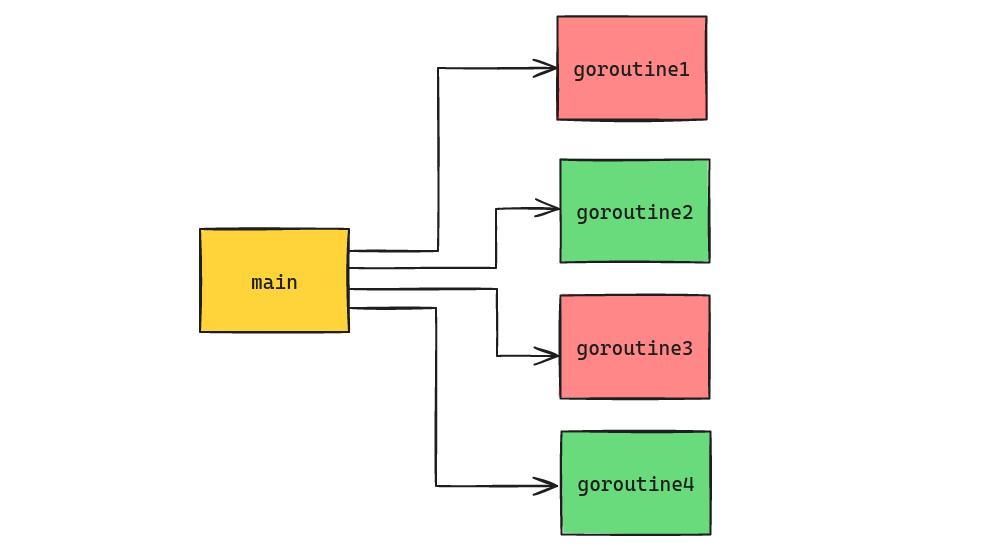Go has a very powerful approach to concurrency. Not unlike other concurrency models, it can be challenging to handle errors. With Go, we utilize goroutines to handle our concurrent workloads. Take, for instance, this situation:

We have our main goroutine which starts four other goroutines. We have a couple of failures (goroutine1 and goroutine3). But how do we collect and handle these errors? There are a couple of ways…
sync.WaitGroup
It’s quite common to use a sync.WaitGroup when working with goroutines. With this approach, it can be difficult to implement proper error handling without dealing with race conditions or deadlocked goroutines. Here’s one way to accomplish this:
1
2
3
4
5
6
7
8
9
10
11
12
13
14
15
16
17
18
19
20
21
22
23
24
25
26
27
28
29
30
31
32
33
34
35
36
37
38
39
40
41
42
43
44
45
46
47
48
49
50
func oddNumbersAreBad(nums <-chan int, errs chan<- error) {
for num := range nums {
fmt.Printf("Received num %d\n", num)
if num%2 == 1 {
errs <- fmt.Errorf("found odd number: %d", num)
return
}
}
}
func main() {
var wg sync.WaitGroup
nums := make(chan int)
errs := make(chan error)
errsDone := make(chan struct{})
numCount := 10
// Collect and cache the errors.
resultErrs := []error{}
go func() {
for err := range errs {
resultErrs = append(resultErrs, err)
}
errsDone <- struct{}{}
}()
// Start worker goroutines to handle our input.
for i := 0; i < numCount; i++ {
wg.Add(1)
go func() {
defer wg.Done()
oddNumbersAreBad(nums, errs)
}()
}
for i := 0; i < numCount; i++ {
nums <- i
}
close(nums)
wg.Wait()
close(errs)
// Block until error caching has completed then read and handle errors.
<-errsDone
for _, err := range resultErrs {
fmt.Printf("Result error: %v\n", err)
}
}
Stepping through this, we create three channels:
numsto provide the input to the worker goroutineserrsto get any and all errors back to themaingoroutineerrsDoneas a signal from the error handling goroutine tomainthat error handling is complete
We first start with spinning up the error handling goroutine:
1
2
3
4
5
6
7
8
// Collect and cache the errors.
resultErrs := []error{}
go func() {
for err := range errs {
resultErrs = append(resultErrs, err)
}
errsDone <- struct{}{}
}()
All this does is loop through the errs channel and stores all of the errors in resultsErrs, which is just a slice of errors. We could do our error handling here, or a subset of it, but in my case I’m just using it to collect and get the errors back to the main goroutine.
One of the more interesting parts of the error handling goroutine is that we use errsDone for coordination to signal to the main goroutine that we have completed. Otherwise we could get in a race condition where the main goroutine isn’t waiting on our error handling goroutine and we could miss out on errors.
Then it’s time to run the worker goroutines to handle the input:
1
2
3
4
5
6
7
8
// Start worker goroutines to handle our input.
for i := 0; i < numCount; i++ {
wg.Add(1)
go func() {
defer wg.Done()
oddNumbersAreBad(nums, errs)
}()
}
We’re creating the same amount of goroutines that we have as input (this can change), and we’re incrementing the WaitGroup and then running the goroutine. The function oddNumbersAreBad does nothing but outputs an error if a number is odd:
1
2
3
4
5
6
7
8
9
func oddNumbersAreBad(nums <-chan int, errs chan<- error) {
for num := range nums {
fmt.Printf("Received num %d\n", num)
if num%2 == 1 {
errs <- fmt.Errorf("found odd number: %d", num)
return
}
}
}
The input is the channel of input numbers as well as the output channel for errors.
Then with the worker goroutines waiting on data on the nums channel, we start pushing our input there:
1
2
3
4
for i := 0; i < numCount; i++ {
nums <- i
}
close(nums)
Closing the nums channel exits the goroutines from their input loop. Then we wait for the goroutines to exit:
1
2
wg.Wait()
close(errs)
Closing the errs channel exits the error handling goroutine from its loop, which then closes the errsDone channel, where our main goroutine is blocking waiting for that signal:
1
2
// Block until error caching has completed then read and handle errors.
<-errsDone
Then finally we can process all of the worker goroutine errors however we need to. In my case, I’m just dumping them to stdout:
1
2
3
for _, err := range resultErrs {
fmt.Printf("Result error: %v\n", err)
}
While this is effective, there is a lot to this solution. Let’s see another way…
errgroup.Group
Go provides a more succinct way to handle goroutine errors with the errgroup.Group implementation. Let’s see how we can do something similar:
1
2
3
4
5
6
7
8
9
10
11
12
13
14
15
16
17
18
19
20
21
22
23
24
25
26
27
28
29
30
31
func oddNumbersAreBad(nums <-chan int) error {
for num := range nums {
fmt.Printf("Received num %d\n", num)
if num%2 == 1 {
return fmt.Errorf("found odd number: %d", num)
}
}
return nil
}
func main() {
var eg errgroup.Group
nums := make(chan int)
numCount := 10
for i := 0; i < numCount; i++ {
eg.Go(func() error {
return oddNumbersAreBad2(nums)
})
}
for i := 0; i < numCount; i++ {
nums <- i
}
close(nums)
if err := eg.Wait(); err != nil {
fmt.Printf("EG result error: %v\n", err)
}
}
Now we only have a single channel, nums, because we don’t need to do the collection and signaling for errors. We first create an instance of errgroup.Group, and then to run a goroutine with the errgroup we call Group.Go:
1
2
3
4
5
for i := 0; i < numCount; i++ {
eg.Go(func() error {
return oddNumbersAreBad(nums)
})
}
Our new version of oddNumbersAreBad doesn’t need to take an error channel as input. It just returns an error (or nil in the absence of one). Group.Go takes a parameter of type func() error, which we use to call our function.
Like before, we provide the input in the nums channel and then close it:
1
2
3
4
for i := 0; i < numCount; i++ {
nums <- i
}
close(nums)
Here’s another main difference with this approach. With the errgroup we call Group.Wait, which returns an error:
1
2
3
if err := eg.Wait(); err != nil {
fmt.Printf("EG result error: %v\n", err)
}
While the collection of goroutines that are managed by the errgroup can return multiple errors, this just returns a single error (it appears like it’s the last non-nil error that’s returned from a goroutine).
That final point is where the errgroup.Group might not be a good fit for your requirements: If you need all of the errors that the goroutines return then you will need to do something different. But, oftentimes the goroutines are all doing the same (or similar) work, so it’s common that the errors are all the same. In that case, a single error is usually a good indication of the underlying problem. But not always.
Summary
While not simple, error handling with concurrent workloads is very important. Go gives you a few ways to approach this and hopefully this blog post has highlighted a couple of those!
